James Augustine Aloysius Joyce (2 February 1882 - 13 January 1941)
aka "Sunny Jim"
James Augustine Aloysius Joyce (2 February 1882 - 13 January 1941)
aka "Sunny Jim"
|
|
|
Chamber Music (1907)
Giacomo Joyce written between 1911 & 14, abandoned. fragments posthumously published in 1968
(I first read in 1970 in UCL Library)
Dubliners (1914)
Famous final paragraph of final story (The Dead)
"A few light taps upon the pane made him turn to the window. It had begun to snow again. He watched sleepily the flakes, silver and dark, falling obliquely against the lamplight. The time had come for him to set out on his journey westward. Yes, the newspapers were right: snow was general all over Ireland. It was falling on every part of the dark central plain, on the treeless hills, falling softly upon the Bog of Allen and, farther westward, softly falling into the dark mutinous Shannon waves. It was falling, too, upon every part of the lonely churchyard on the hill where Michael Furey lay buried. It lay thickly drifted on the crooked crosses and headstones, on the spears of the little gate, on the barren thorns. His soul swooned slowly as he heard the snow falling faintly through the universe and faintly falling, like the descent of their last end, upon all the living and the dead."
Portrait of the Artist as a Young Man - (1916)
|
Starts experimentally: "Once upon a time and a very good time it was there was a moocow coming down along the road and this moocow that was down along the road met a nicens little boy named baby tuckoo.... His father told him that story: his father looked at him through a glass: he had a hairy face. He was baby tuckoo. The moocow came down the road where Betty Byrne lived: she sold lemon platt.
He sang that song. That was his song.
When you wet the bed, first it is warm then it gets cold. His mother put on the oilsheet. That had the queer smell."
|
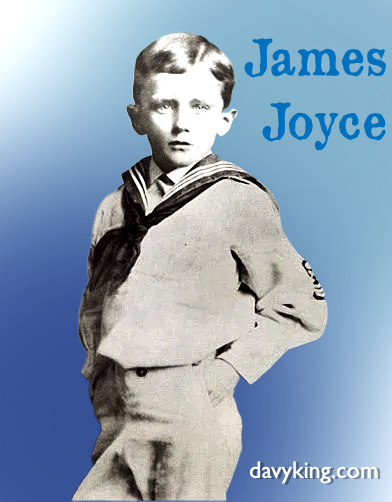 sailor costume, aged 6 |
|
Stephen Dedalus says: "I will tell you what
I will do and what I will not do. I will not serve that in which I no
longer believe, whether it calls itself my home, my fatherland, or my
church: and I will try to express myself in some mode of life or art as
freely as I can and as wholly as I can, using for my defense the only
arms I allow myself to use - silence, exile, and cunning." (In exile like Dante, he remained in voluntary exile from 1912 till death. During their exile, the Joyces occupied 10 different housing units in Trieste, 8 in Zurich and 19 or 20 in Paris. A protracted odyssey, indeed..) Remember in Greek mythology, Daedalus, artist, craftsman, creator of labyrinth, was, father of Icarus. "The personality of the artist, at first a cry or a cadence or a mood and then a fluid and lambent narrative, finally refines itself out of existence, impersonalizes itself, so to speak. The esthetic image in the dramatic form is life purified in and reprojected from the human imagination. The mystery of esthetic, like that of material creation, is accomplished. The artist, like the God of creation, remains within or behind or beyond or above his handiwork, invisible, refined out of existence, indifferent, paring his fingernails."
"a priest of the eternal imagination, transmuting the daily bread of experience into the radiant body of everliving life."
|
|
(Studied 'Portrait' for O levels beginning a life-long love of Joyce)
***
Exiles (1918) Saw in London's Mermaid Theatre in 1970, directed by Harold Pinter
That word, exile, again. See above.
***
"I am now writing a book based on the wanderings of Ulysses. 'The Odyssey,' that is to say, serves me as a ground plan. Only my time is recent and all my hero's wanderings take no more than 18 hours." - James Joyce, 1918
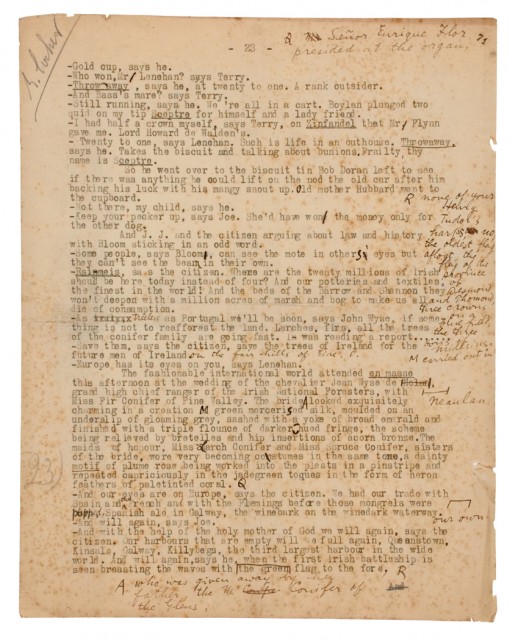 |
Single typescript leaf, consisting of page 23 from the printer's typescript manuscript for Chapter Twelve of Ulysses. The text of the leaf begins "- Gold cup, says he." and ends ..."the green flag to the fore."Sold for $50K at auction. More than Joyce received for writing the entire book! ***
(Joyce
Caricature Sketch of Leopold Bloom 1926) Quotes the opening passage of Homer's Odyssey: "Tell me, muse, of that man of many turns, who wandered far and wide." |
"Love loves to love love. Nurse loves the new chemist. Constable 14A loves Mary Kelly. Gerty MacDowell loves the boy that has the bicycle. M. B. loves a fair gentlema. Li Chi Han lovey up kissy Cha Pu Chow. Jumbo, the elephant, loves Alice, the elephant. Old Mr Verschole with the ear trumpet loves old Mrs VErschoyle with the turnedin eye. The man in the brown macintosh loves a lady who is dead. His Majesty the King loves Her Majesty the Queen. Mrs Norman W. Tupper loves officer Taylor. You love a certain person. And this person loves that other person because everybody loves somebody but God loves everybody." (Ulysses)
"Every life is in many days, day after day. We walk through ourselves, meeting robbers, ghosts, giants, old men, young men, wives, widows, brothers-in-love. But always meeting ourselves."
"We can't change the world, but we can change the subject."
|
"The sacred pint alone can unbind the tongue"
"The voices blend and fuse in clouded silence: silence that is infinite of space: and swiftly, silently the sound is wafted over regions of cycles of cycles of generations that have lived.""That is God... A shout in the street"
"I was a Flower of the mountain yes when I put the rose in my hair like the Andalusian girls used or shall I wear a red yes and how he kissed me under the Moorish wall and I thought well as well him as another and then I asked him with my eyes to ask again yes and then he asked me would I yes to say yes my mountain flower and first I put my arms around him yes and drew him down to me so he could feel my breasts all perfume yes and his heart was going like mad and yes I said yes I will Yes." (Final paragraph)
The night my dad died, I, aged 16, was lying in bed, before sleep, reading Ulysses, Joyce's novel about fathers & sons.
|
click pic? (Mmm Marilyn Monroe reading Ulysses) |
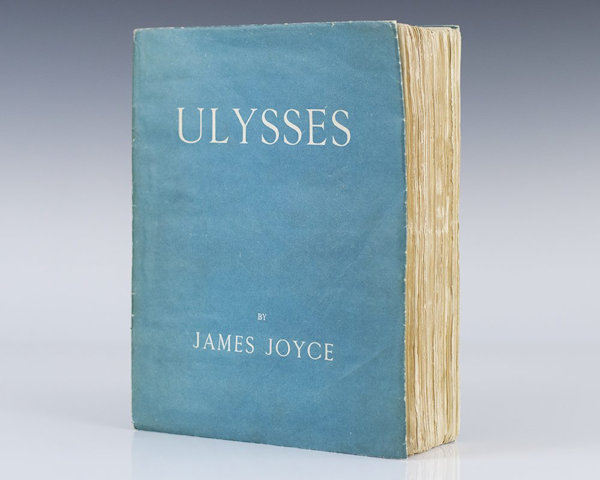 |
"I've put in so many enigmas and puzzles that it will keep the professors busy for centuries arguing over what I meant, and that's the only way of insuring one's immortality." (Joyce said of Ulysses)
|
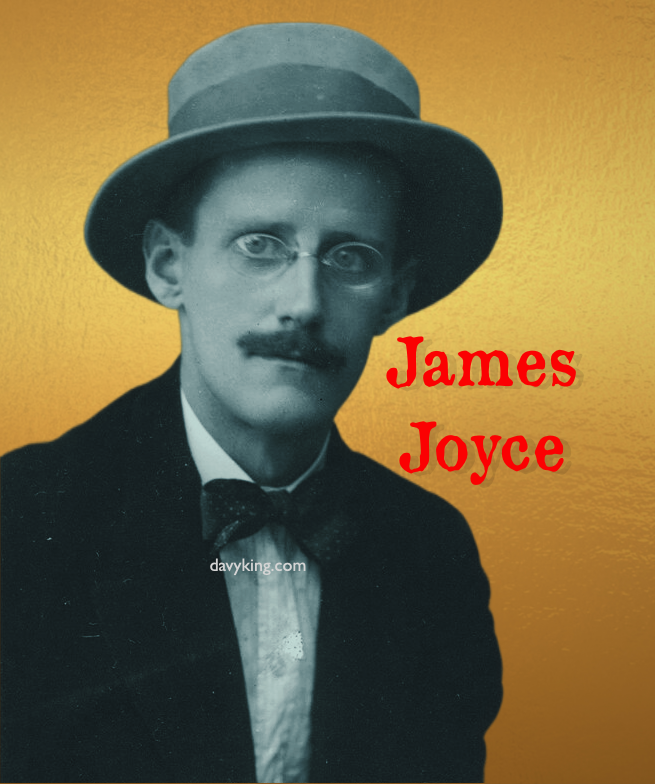 |
(1915 Zurich)
|
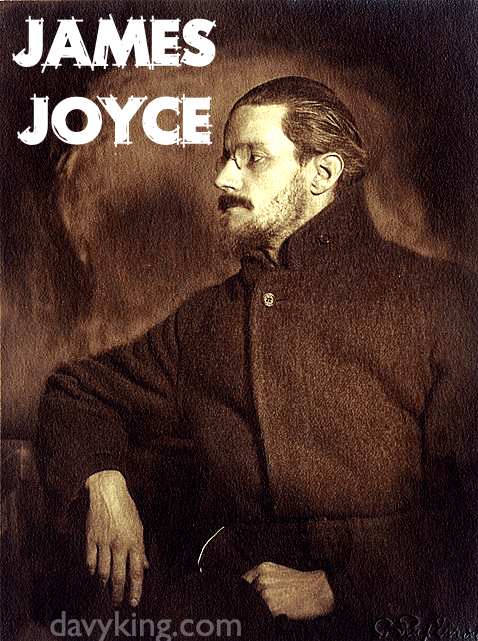
C.1918,
Revolutionary Joyce in
Zurich by Conrad Ruf,
modified by moi |
"A man of genius makes no mistakes. His errors are volitional and are the portals of discovery."
―Ulysses***
Pomes Pennyeach (1927)
(1922 - 4h May 1939)
|
"lots of fun at Finnegan's Wake" & verbally verily Opening paragraph: "riverrun, past Eve and Adam's, from swerve of shore to bend of bay, brings us by a commodious vicus of recirculation back to Howth Castle and Environs." Final sentence: " A way lone a last a loved a long the" da capo & so on & on, round & round without end... (like this website from start to stop ?) "riverrun" possibly puns french 'rêverons' = let us dream together)
|
(Joyce at age 41, 1923, Bognor Sussex. Just finished Ulysses & starting FW)
|
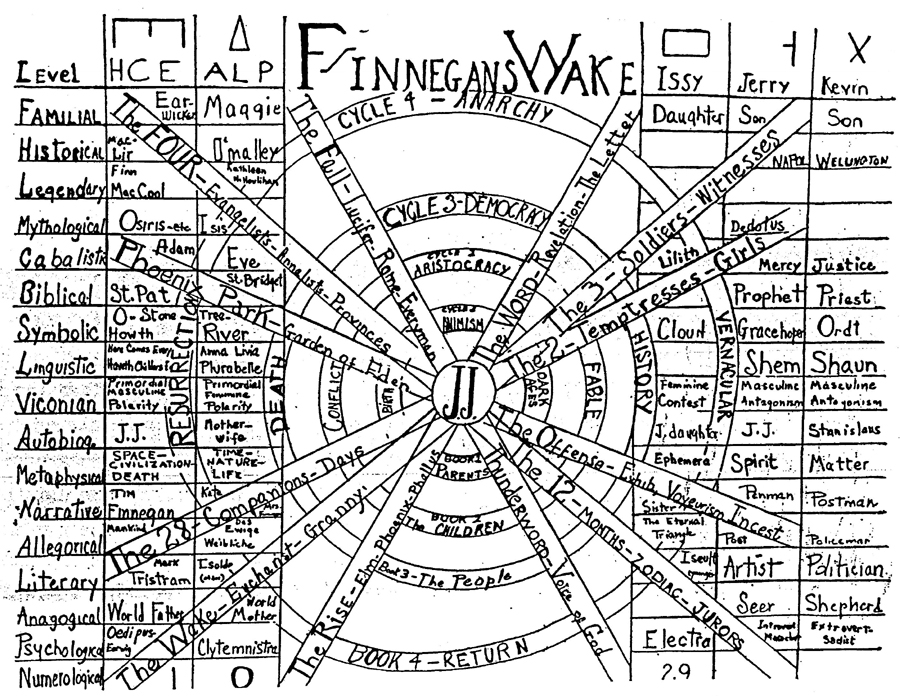
"Let us leave theories there and
return to here's hear."
|
(illustration by John
Vernon Lord
The fall of the giant
Finn MacCool, Adam, Humpty Dumpty, Parnell, Lucifer and all other falls
through history, including Wall Street crashes. In the background,
towers are being erected - the New York Woolworth building, the Tower of
Babel and the Eiffel Tower.
'Oftwhile balbulous, mithre ahead, with
goodly trowel in grasp and ivoroiled overalls which he habitacularly
fondseed, like Haroun Childeric Eggeberth he would
caligulate by multiplicab-les the alltitude and malltitude until he
seesaw by neatlight of the liquor wheretwin twas born, his roundhead
staple of other days to rise in undress maisonry upstanded (joygrantit!),a
waalworth of a skyerscape of most eyeful hoyth entowerly, erigenating
from next to nothing and celescalating the himals and all,
hierarchitectitiptitoploftical, with a burning bush abob off its
baubletop and with larrons o'toolers clittering up and tombles a'buckets
clottering down.' (page 4.34-5.05) |
'bairdboard bombardment screen' - Joyce prophetically describes a television in a pub, 8 years before the very first. 20 years before Irish bars! He wrote this in 1937:
"In the heliotropical noughttime following a fade of transformed Tuff and, pending its viseversion, a metenergic reglow of beaming Batt, the bairdboard bombardment screen, if tastefully taut guranium satin, tends to teleframe and step up to the charge of a light barricade. Down the photoslope in syncopanc pulses, with the bitts bugtwug their teffs, the missledhropes, glitteraglatteraglutt, borne by their carnier walve. Spraygun rakes and splits them from a double focus: grenadite, damnymite, alextronite, nichilite: and the scanning firespot of the sgunners traverses the rutilanced illustred sunksundered lines. Shlossh ! A gaspel truce leaks out over the caeseine coatings. Amid a fluorescence of spectracular mephiticism there caoculates through the inconoscope stealdily a still, the figure of a fellowchap in the wohly ghast, Popey O'Donoshough, the jesuneral of the russuates. The idolon exhibisces the seals of his orders: the starre of the Son of Heaven, the girtel of Izodella the Calottica, the cross of Michelides Apaleogos, the latchet of Jan of Nepomuk, the puffpuff and pompom of Powther and Pall, the great belt, band and bucklings of the Martyrology of Gorman. It is for the castomercies mudwake surveice. The victar. Pleace to notnoys speach above your dreadths, please to doughboys. Hll, smthngs gnwrng wthth sprsnwtch! He blanks his oggles because he confesses to all his tellavicious nieces." (349.06-29)
(BTW Joyce opened Ireland's first ever cinema in 1906.)
"Television kills telephony" (52,18) Indeed, so an a modern smart phone you can now watch videos as well live action. Charge of the LIGHT brigade, as it were.
"The farascope of television"
Prophetically anticipating Apple's iPhone, JJ coins the term "iSpace?!" (P124)Just joking!?
The word QUARK for an elementary subatomic article comes from Finnegans Wake: "Three quarks for Muster Mark!" (Book 2 Episode 4 page 383.) Check out strange & charm in Quantum Dancing here.
Re the unconventional language:
"One great part of every human existence is passed in a state which cannot be rendered sensible by the use of wideawake language, cutanddry grammar and goahead plot.
"In writing of the night, I really could not, I felt, use words in their
ordinary connections ... that way they do not express how things are in the
night, in the different stages - conscious, then semi-conscious, then
unconscious. I found that it could not be done with words in their ordinary
relations and connections. When morning comes of course everything will be clear
again . . . .I 'll give them back their English language. I'm not destroying it
for good."
Multilingual puns. Portmanteau
words. Neologisms. Wordplay. Verbal acrobatics. Polyglot extravaganza. Featuring
elements of up to 60 different languages, all mixed up. For 628
pages.
Irish stew of meaningfully skewed, wonky words. Idiosyncratic. Nonlinear Fluid
night language.
NB FW is set at night, whereas Ulysses is day.
I challenge U to spot the TYPOS in FW. No-one would notice. The initial edition of Ulysses was full of typos. Over 5000.
JJ wrote: "I'd
like a language which is above all languages, a language to which all will do
service. I cannot express myself in English without enclosing myself in a
tradition"
***
It's a sort of history of writing: "A bone, a pebble, a ramskin ... leave them to cook in the mutthering pot: and Gutenmorg with his cromagnon charter, tintingfats and great prime must once for omniboss stepp rubrickredd out of the wordpress" (20.5).
Talking of History, Joyce mentions more than once Hengest and Horsa, significantly brothers, who led the Angles, Saxons and Jutes in the 5th Century invasion of England at Ebbsfleet, Isle of Thanet, near where Yours TrulyTM was born "Is that the great Finnleader himself in his joakimono on his statue riding the high horse there forehengist?" plus P143 ("hengs got a bit of Horsa's ose") et passim
"It's something fails us. First we feel. Then we fall. And let her rain now if she likes. Gently or strongly as she likes. Anyway let her rain for my time is come. I done me best when I was let. Thinking always if I go all goes. A hundred cares, a tithe of troubles and is there one who understands me? One in a thousand of years of the nights?"
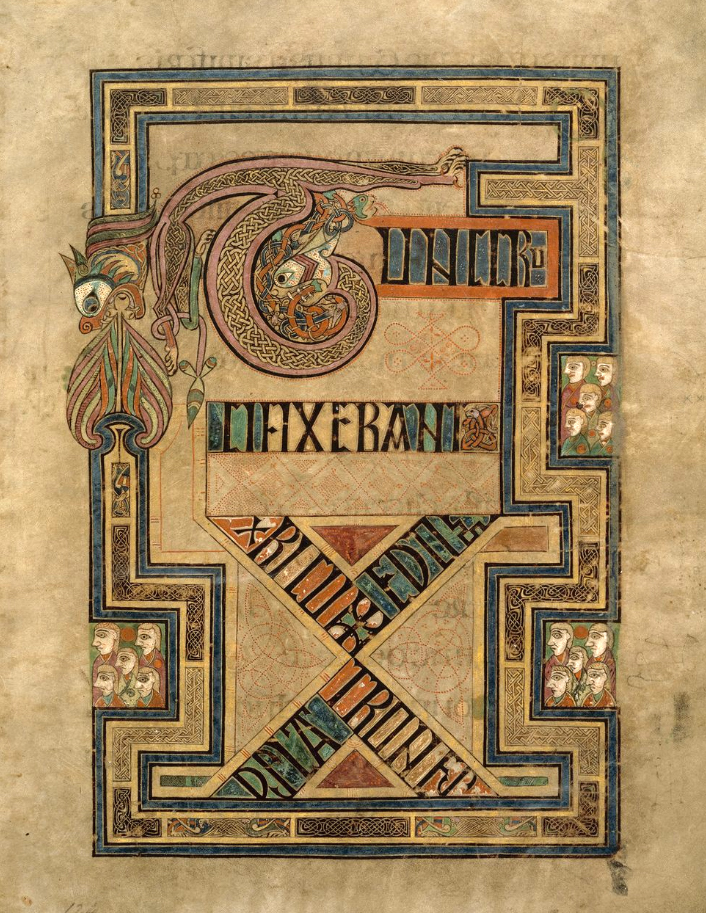 (Colorful, intricate Tunc page from Book of Kells)
|
In
a letter to a friend, Joyce wrote about the Book of Kells: 'In all the places I have been to, Rome, Zurich, Trieste, I have taken it about with me, and have pored over its workmanship for hours. It is the most purely Irish thing we have, and some of the big initial letters which swing right across the page have the essential quality of a chapter of Ulysses. Indeed, you can compare much of my work to the intricate illuminations.' In FW, he repeatedly draws attention to the Tunc page: 'I've
read your tunc's
dismissage' (Page 298)
Page shows the sentence from the Matthew
Gospel: "Then there were crucified with him two thieves" in Latin as "Tunc cru
cifixerant XPI cum eo du os la trones" and it is that first elaborate "Tunc"
that the page is named after. The entire page is encircled by the familiar
mythological symbol of the self-consuming, self-renewing serpent, Orobourus. The
serpent has a lion head and the "T" in the word "Tunc" (that
J-looking thing that jumps out of the page) is also a lion with serpent
attributes that is "either swallowing or emitting (or both) a tangled
pair-of-opposites." Joseph Campbell explains, the serpent is representative of
"the lunar mystery of time," life waxing and waning, rising up and then dying,
within the sphere of time while the lion is "the solar power, the sun door to
eternity." The serpent then is the "demiurgic, world-creating and -maintaining
principle, or...the God of the Old Testament" according to Campbell while the
lion is the New Testament view, the eternal door, the "way and the light," the
Redeemer (the New Testament is considered to have redeemed the Old Testament.
The Greek letters XPI inserted in the text after "crucifixerant" are the Greek
letters of abbreviation for Christ and, if you turn the page clockwise to lie on
its right side, you see that XPI is spelled in big letters on the page. The huge
curled "T" becomes the circle in the Greek "P", the middle letter "symbolizing
the Savior between the two thieves" but here is where it all comes together: the
whole thing is uniting these lunar and solar symbols beautifully. It is on the
fifteenth day of each lunar month that the full moon appears directly across
from the sun which shines on it and now observe, along the border of the page in
the curving serpent's body, there are three groups of five men, fifteen. Easter
(the most important day in Christianity, celebrating Christ's resurrection after
being crucified) is celebrated on the first Sunday after the full moon on or
following the Spring equinox and, as described in the Synoptic Gospels, the
crucifixion took place on the fifteenth day of the Jewish month of Nisan which
is around March-April. It all seems to be "a lunar theme of death and
resurrection." Tunc is also a sexual anagram. Cunt?! |
There are references to rainbow colours throughout : "Roserude and oragious grows gelb and greem, blue out the ind of it! Violet's dyed" (P143)\
"Yes, there was that skew arch of chrome sweet home, floodlit up above the flaberghosted firmament...Thalk bout iridecencies! Ruby and beryl and chrysolite, jade, sapphire, jasper and lazuli"(p494 , 3-7)
A rainbow appears on the very first page: " rory end the regginbrow was to be seen ringsome on the aquaface"
"a beam of sunshine upon a coffin plate" (59, 19)
"(I am working out a quantum theory about it for it is really most tantumising state of affairs)"
"The Gracehoper was always jigging ajog, hoppy on akkant of his joyicity."
"And you'll miss me more as the narrowing weeks wing by. Someday duly, oneday truly, twosday newly, till whensday."
"All moanday, tearsday, wailsday, thumpsday, frightday, shatterday till the fear of the Law" (Part 2 chaper2)
"Lord, heap miseries upon us yet entwine our arts with laughters low."
"As Great Shapespeare puns it." He puns Shakespeare's name a few times: eg "Shockspeare" Personally, I was pleased to invent Great Shakes, as a character in one of myabandoned experimental works.
"houhnhymn songtoms" (Part 1, Page 15) Swift is referred to passim in FW.
'gullible's travels' (I73.3) Gulliver?
JJ refers to Blake's Four Zoahs ("zoans") from Jerusalem (FW Page 57.7) He mentions Blake again on Page 563..7-9
Anglo-Irish writer Laurence Sterne's Tristam Shandy had an influence.
"A stern poise for a swift pounce" (282)
Lewis Carrol was an obvious precursor. Jabberwoky, Hunting of the Snark etc. His use of wordplay, portmanreau words, reading words backward.
"Tis jest jibberweek's joke" (FW 565.14)
Not forgetting Edward Lear....
Others more recently influenced by nonsense, gobbledygook & gibberish: Stanley Unwin, Spike Milligan & John Lennon In His Own Write & A Spaniard in the Works. According to Thomas Staley (heard during a lecture in Austin), John Lennon was one of the earliest subscribers to the James Joyce Quarterly. 'I am the Walrus' may have inspired by FW. Incidentally, there is a photo of James Joyce, barely visible, 2nd row, 2nd from right, on the cover of The Beatles' Sgt. Pepper's Lonely Hearts Club Band. A copy of FW book is shown on Lennon's '(Just Like) Starting Over' video.
"Let's root out.
Brimstoker and give him the thrall of our lives. It's
Dracula's nightout"
***
There is even a comic donkey or ass braying hee hee haw (Page 395). "Roping their ass he was, their skygrey globetrotter (475.29)
"In the name of Annah the Allmaziful, the Everliving, the Bringer of Plurabilities, haloed be her eve, her singtime sung, her rill be run, unhemmed as it is uneven!"
" Padma, brighter and sweetster, this flower that bells, it is our hour or risings. Tickle, tickle. Lotus spray. "
"without links, without impediments, with gygantogyres,with freeflawforms; parasama to himself; atman as evars;"
"allahallahallah,
and on the sponthesite it is the alcovan and the rosegarden, boony noughty, all
puraputhry. Why? One's apurr apuss a story about brid and breakfedes and
parricombating and coushcouch but others is of tholes and oubworn buyings,
dolings and chafferings in heat, contest and enmity. Why? Every talk has his
stay, vidnis Shavarsanjivana, and all-a-dreams perhapsing under lucksloop at
last are through. Why? It is a sot of a swigswag, systomy dystomy, which
everabody you ever anywhere at all doze. Why? Such me.
And howpsadrowsay.
Lok! A shaft of shivery in the act, anilancinant. Cold's sleuth! Vayuns! Where
did thots come from? It is infinitesimally fevers, resty fever, risy fever, a
coranto of aria, sleeper awakening, in the smalls of one's back presentiment,
gip, and again, geip, a flash from a future of maybe mahamayability through the
windr of a wondr in a wildr is a weltr as a wirbl of a warbl is a world."
Allusion to Shiva & Shakti.
Joyce refers to tat svam asi (= thou art it too/ that thou art), famous vedic nondual aphorism from the Upanishads : "From thee to thee, thoo art it thoo, that thouest there" (Page 601 11-12)
"And so it all ended. Artha kama dharma moksa." (Book 1, page 93- line 22)
"In the ignorance that implies the impression that knits knowledge that finds the nameform that whets the wits that convey contacts that sweeten sensation that drives desire that adheres to attachment that dogs death that bitches birth that entails the ensuance of existentiality."
That alludes to Buddhist 12 links of dependent origination (pratityasamutpada).
There are repeated references to Buddha throughout eg "collects rare buddhas" (P544.24)There's definitely a Bo-Tree somewhere!
***
"Have you heard of one
Humpty Dumpty
How he fell with a roll and a rumble
And he curled up like Lord Olofa Crumple"
"Humpty Dump Dublin squeaks through his norse;
Humpty Dump Dublin hath a horrible vorse;
But for all his kinks English, plus his irismanx brogues
Humpty Dump Dublin's granddada of all rogues."
***
"the first till last alshemist wrote over every square inch of the only foocap available, his own body, till by its corrosive sublimation onecontinuous present tense integument slowly unfolded all marry-voising moodmoulded cyclewheeling history (thereby, he said,reflecting from his own individual person life unlivable, trans-accidentated through the slow fires of consciousness into a divi-dual chaos, perilous, potent, common to allflesh, human only,mortal) but with each word that would not pass away the squid-self which he had squirtscreened from the crystalline worldwaned chagreenold and doriangrayer in its dudhud" (p186) NB Oscar Wilde reference
Joyce refers to the Emerald Tablet of Hermes Trismegistus' as above, so below: "The tasks above are as the flasks below, saith the emerald canticle of Hermes and all's" (page 263)
You kidding us with the Euclidean?
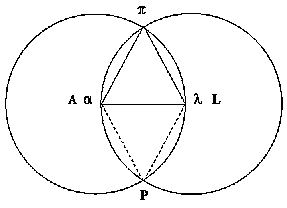
(Page 293)
vulva yoni Shakti?
lingam 'lifewand' - 'he lifts the lifewand and the dumb speak'
"kept my wicket up"
There's a reference to Yggdrasil , the world tree in 'eggdrazzles' (p304 l35). Many other trees, ash, elm etc.
"A is for Anna like L is for liv. Aha hahah, Ante Ann you're apt to ape aunty annalive! Dawn gives rise. Lo, lo, lives love! Eve takes fall. La, la, laugh leaves alas! Aiaiaiai, Antiann, we're last to the lost, Loulou! Tis perfect. Now (lens your dappled yeye here" (P294)
"Humphrey's unsolicited visitor, Davy" (Page 70)
'Brékkek Kékkek Kékkek Kékkek! Kóax Kóax Kóax!' (page 4) is from the chorus of frogs in the comedy The Frogs by the Greek playwright Aristophanes; it's onomatopoeic in Greek.
'blew some quaker's (for you! Oates!) in through the houseking's keyhole:"(Page 70, lines18-9)
"Quacker Mating." Funnily enough (tho it's obvious really) I used the Qua(c)ker pun & was amused by it before I knew Joyce had. Missed Mating for Meeting.
JJ's generous patron, Harriet Shaw Weaver, who, over the years, kindly gave him the equivalent of over £1 million (in today's currency) cane from a rich Quaker family. Incidentally, there is a Quaker Librarian in Ulysses, mentioned 13 times: 'The quaker librarian, quaking, tiptoed in, quake, his mask, quake, with haste, quake, quack.'
If you'd like to become a patron of this writer (me), please click here.
"So. Avelaval. My leaves have drifted from me. All. But one clings still. I'll bear it on me. To remind me of. Lff! So soft this morning, ours. Yes. Carry me along, taddy, like you done through the toy fair! If I seen him bearing down on me now under whitespread wings like he'd come from Arkangels, I sink I'd die down over his feet, humbly dumbly, only to washup."
Here's a delicious food-based taste of FW to tempt:
"Shem was a sham and a low sham and his lowness creeped out first via foodstuffs. So low was he that he preferred Gibsen's tea- time salmon tinned, as inexpensive as pleasing, to the plumpest roeheavy lax or the friskiest parr or smolt troutlet that ever was gaffed between Leixlip and Island Bridge and many was the time he repeated in his botulism that no junglegrown pineapple ever smacked like the whoppers you shook out of Ananias' cans, Findlater and Gladstone's, Corner House, Englend. None of your inchthick blueblooded Balaclava fried-at-belief-stakes or juicejelly legs of the Grex's molten mutton or greasilygristly grunters' goupons or slice upon slab of luscious goosebosom with lump after load of plumpudding stuffing all aswim in a swamp of bogoakgravy for that greekenhearted yude! Rosbif of Old Zealand! he could not attouch it. See what happens when your somatophage merman takes his fancy to our virgitarian swan? He even ran away with hunself and became a farsoonerite, saying he would far sooner muddle through the hash of lentils in Europe than meddle with Irrland's split little pea. Once when among those rebels in a state of hopelessly helpless intoxication the piscivore strove to lift a czitround peel to either nostril, hic-cupping, apparently impromptued by the hibat he had with his glottal stop, that he kukkakould flowrish for ever by the smell, as the czitr, as the kcedron, like a scedar, of the founts, on moun-tains, with limon on, of Lebanon. O! the lowness of him was beneath all up to that sunk to! No likedbylike firewater or first- served firstshot or gulletburn gin or honest brewbarrett beer either. O dear no! Instead the tragic jester sobbed himself wheywhing-ingly sick of life on some sort of a rhubarbarous maundarin yella- green funkleblue windigut diodying applejack squeezed from sour grapefruice and, to hear him twixt his sedimental cupslips when he had gulfed down mmmmuch too mmmmany gourds of it retching off to almost as low withswillers, who always knew notwithstanding when they had had enough and were rightly indignant at the wretch's hospitality when they found to their horror they could not carry another drop, it came straight from the noble white fat, jo, openwide sat, jo, jo, her why hide that, jo jo jo, the winevat, of the most serene magyansty az archdio-chesse, if she is a duck, she's a douches, and when she has a feherbour snot her fault, now is it? artstouchups, funny you're grinning at, fancy you're in her yet, Fanny Urinia . (Page 170 -1)
'and soforth, you know'
& so on & so fifth etc
***
|
JJ created 'Sigla' for FW. "The Doodles family'' appear at the foot of Page 299. Joyce first mentioned it in a letter to his patron in 1924:
|
|
***
1965 film Passages from Finnegans Wake, directed by Mary Ellen Bute, attempted the impossible and did a brilliant filmed version, subtitled with original text. Easy to follow.
Recommend A Skeleton Key to Finnegans Wake by Joseph Campbell to help make sense of JJ's final verbal flourish in FW. b Roland McHugh's Annotations to Finnegans Wake, useful too.
***
There are many fans of FW. Samuel Beckett, Thornton Wilder, etc:
Aleister
Crowley: "I am convinced that Mr Joyce is a genius all the world will have
to recognize."
Timothy Leary: "Joyce's prose prepared me to enter psychedelic space"
'about as close to lsd on the page as you can get' -Terence McKenna
Surfing on Finnegans Wake, below.
"If you've never had a psychedelic, reading Joyce is the Next best equivalent. -
Robert Anton Wilson
"Joyce's book is called Finnegans Wake. The missing apostrophe creates another pun, which Joyce explained to friends as a warning to the ruling classes: the oppressed rise, eventually in every historical cycle." - Robert Anton Wilson
"'I have just read Finnegans Wake aloud at a time when takers of LSD said, that is just like LSD' So I have begun to feel that LSD may just be the lazy man's form of Finnegans Wake." - Marshall McLuhan
"I'm going to prove that Finnegans Wake is an information pool based on computer memory systems that didn't exist until centuries after James Joyce's era; that Joyce was plugged into a cosmic consciousness. From which he derived the inspiration for his entire corpus of work." - Philip K. Dick
FW contains the initials LSD but is, of course, referring to old-fashioned Pounds, Shillings and Pence.
***
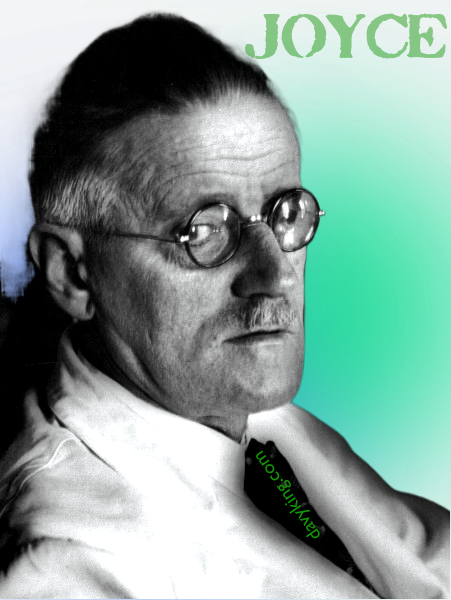
| Here's are brief extracts from a
lecture by Terence McKenna,
called "Surfing on Finnegans Wake," given at the Esalen Institute in
1995: "there is an
Irish drinking ballad of great antiquity called the ballad of Tim
Finnegan, or the Ballad of Finnegans Wake. It tells the story of Tim
Finnegan who was a hod carrier, a bricklayer's assistant, and he was
given to hitting the poitín rather hard and he fell from his ladder.
It's the Humpty Dumpty story. He fell from his ladder and he broke his
back and his friends waked him in the grand Irish fashion and at the
height of the wake, they became so carried away and intoxicated that
they upended a bucket of Guinness over his head and he revived and
joined the dance.This is the resurrection. Tim Finnegan is very clearly
for Joyce a Christ figure and here is then the first evocation of Tim
Finnegan. The fall, then the Viconian thunder of a once wallstrait
oldparr, which is just an old person, is retaled early in bed and later
on life down through all christian minstrelsy. The great fall of the
offwall entailed at such short notice the pftjschute of Finnegan. Now
this pftjschute is Norwegian I'm informed and it refers to the act of
falling and the act of falling from a hill. Finnegan, erse solid man,
that the humptyhillhead of humself prumptly sends an unquiring one well
to thewest in quest of his tumptytumtoes: and their
upturnpikepointandplace is at the knock out in the park where oranges
have been laid to rust upon the green since devlinsfirst loved livvy.
This is fairly transparent if you're Irish or a citizen of Dublin
because what it's talking about: Dublin is imagined to be situated
basically in the belly of an enormous giant person who is Finnegan.
Finnegan lies like a giant reclining figure along the liffey there.
Husband and wife, river and mountain, and the focus has changed and now
we're talking about the geography. He was a solid man, erse solid man,
that the humptyhillhead of humself prumptly sends an unquiring one well
to thewest in quest of his tumptytumtoes. If you have a map of Dublin
laid out, you can actually see this enormous man in the landscape and
there are many enormous men and women in the landscape of this planet.
Joyce maps the Dublin geography over all of them. Some of you may know
Iztaccihuatl, the magical mountain in Mexico. Iztaccihuatl means the
sleeping woman in Toltec and many mountains are imagined to be sleeping
people. So here he introduces this theme and this is one paragraph.
This is the invocation of Finnegan as hod carrier: "Finnegans Wake is psychedelic and it is apocalyptic/eschatological. What I mean by those phrases is - first of all what I mean by psychedelic is there is no stable point of view. There is no character per se. You never know who is speaking. You have to read into each speech to discover is this King Mark, Anna Livia Plurabelle, Humphrey Chimpden Earwicker, Shem the Penman, Shaun - who is it? Identities are not fixed. Those of you who have followed my rap over the years, I'm always raving about how psychedelics dissolve boundaries. "
(The whole
lecture is worth
listening to.) |
BTW More recently, in a 2013 Rolling Stone
interview with famous Film Actor Johnny Depp, it says "he always carries around
a copy of Finnegans Wake, which he's been puzzling through for years."
Incidentally, he also has a tattoo on his left, lower, inside arm bearing the
well-known words from Portrait: "Silence Exile
Cunning."
***
Joyce had his first glasses aged 6. Later in life, he endured eleven painful eye operations. How heroic. Ended up blind in left eye, 10% vision in right. When older. he used a magnifying glass as well as eyeglasses to read.
color.png) |
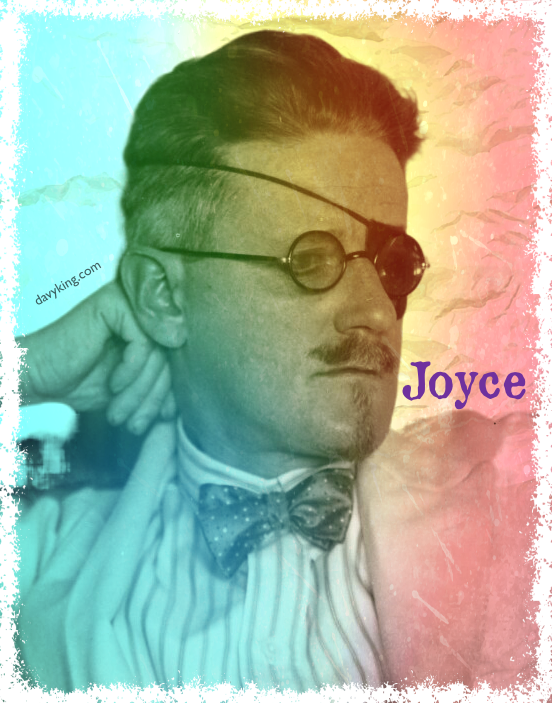 |
dk.png)
(NOT
Simpson) |
JJ met Russian
Film Director Eisenstein. J had a keen interest in Cinema. Remember he
opened Ireland's first ever cinema in 1906. Ulysses & FW uses a sort of
Montage technique
Also, Joyce used CUBIST multiple points of view.
|
|
Here Comes Everyone Haveth Childers Everywhere Howth Castle and Environs Humphrey Chimpden Earwiker Hengler's Circus Entertainment Heinz Cans Everwhere How Copenhagen ended How charmingly exquisite
Human Conger Eel
|
How Clever Eh? Just made that up. It's contagious! Have fun finding some more.
Joyce found the same of Earwicker on a grave in Sidlesham, a village in Sussex, during a car excursion with T.S. Eliot, while on holiday in Bognor Regis.
By the seaside in Bognor, Joyce heard seagulls, which found their way into a 1927 draft of FW:
"Over them the winged ones screamed their glee, seahawk, seagul (sic) curlew and plover kestrel capercailzie. All the birds of the sea they trolled out rightbold and they heard of the kiss of Tristan and Isolde. So sang sea birds...
- Three caws for for Mister MarkSure he hasnt got much of a bark"
ALP
Anna Livia Plurabelle (1930)
Shem, Shaun & Issy (Izzy, Iseult)
'Shem the Penman' is an alter-ego for JJ "Shame's voice'
etc
***
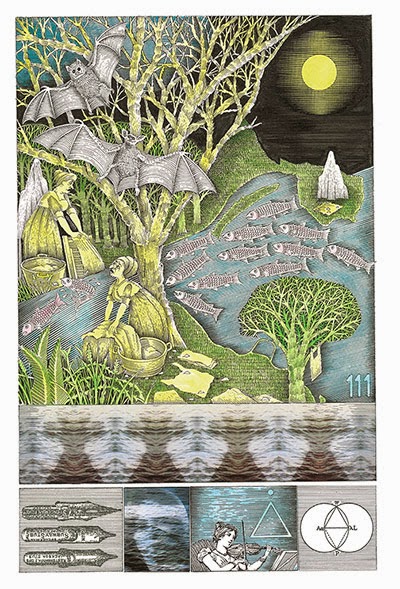
(illustration by John Vernon Lord |
2
washerwomen gossiping about HCE and Anna
Livia Plurabelle by the banks of the Liffey. The river expands into
a map of Dublin Bay, thus illustrating how the women become further
apart from each other during the course of their gossiping. Bats fly
above them ('The chittering waters of.
Flittering bats, fieldmice bawk talk'),
and salmon are swimming in the river, a recurring theme throughout the
book: 'like any gay lord salomon, her bulls
they were ruhring, surfed with spree'. Below
the moon, a few stones can be seen on the
sheet below the large rock, representative of the transformation of one
of the washerwomen and symbolising the static state of permanence.
'I feel as heavy as yonder stone.'
A butcher's apron hangs from the smaller tree;
a tree that represents the transformation of the other washerwoman,
symbolising growth, movement and eventual death. 'I
feel as old as yonder elm'
(In the
soundtrack Joyce describes this section.) |
***
Letters, many quite rude eg Nora Barnacle Farting
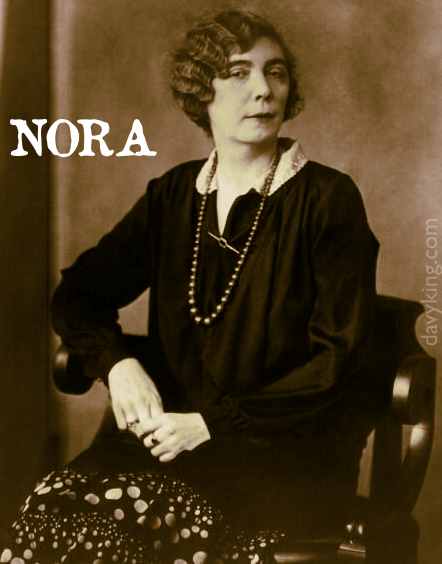 |
Bloomsday, 16 June 1904, also date of his first outing or date with Nora Barnacle, who put her hand down his trousers and masturbated him. Encouraging. She, as they say, proved a 'keeper.' She stuck to him.
*** Re FW, she asked him: "Why don't you write books people can read?" *** She confided to her sister, 'He's a weakling, Kathleen. I always have to be after his tail. I wish I was married to a man like my father. Being married to a writer is a very hard life.''***
Also re FW, Edna O'Brian,
Irish novelist, wrote:
|
***
The Cat & The Devil - written in 1936 for his grandson, Stephen, published in 2021. Charming little book, prettily illustrated, new to me.
***
|
J, G, N, L |
 James, Giorgio |
|
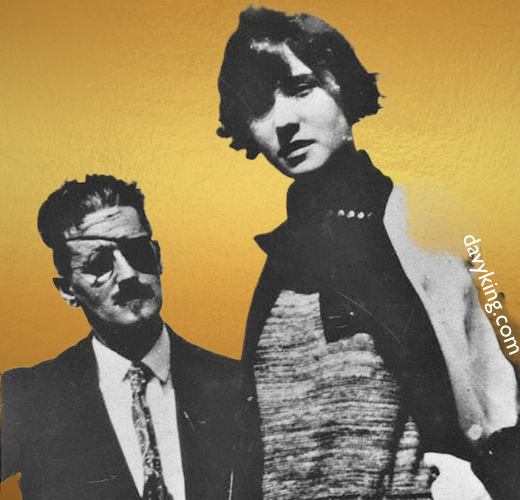 |
Childers: son Giorgio & daughter Lucia
| As
a teenager, LUCIA
pursued a career as a modern dancer and was an accomplished
illustrator. At 20, having abandoned both, she fell hopelessly in love
with Samuel
Beckett,
a 21-year-old acolyte of her father. He soon ended their one-sided
relationship, an incident that may have triggered a psychotic break. She perhaps provided a model for the language of Finnegans Wake. As Joyce once remarked, "People talk of my influence on my daughter, but what about her influence on me?" When Joyce spoke of his daughter, he would refer to her fits as "scenes from King Lear". He always defended her talents as a brilliant artist, an amazing being and one of the only people who, according to him, could really understand him. For Joyce, Lucia spoke the same language as he did. In 1934, Carl Jung treated Lucia. After their appointment, Joyce asked the Swiss doctor: "Doctor Jung, have you noticed that my daughter seems to be submerged in the same waters as me?" to which he answered: "Yes, but where you swim, she drowns." Jung analysed her. He was unable to help her, and Joyce reluctantly had her committed. She was diagnosed as schizophrenic. Beckett was one of the few people to visit her later in the psychiatric hospital where she died in 1982, after decades of institutionalization. In 1989, when Beckett died, this photograph of her as a dancer dressed as a fish was found among his belongings. (I provided a
new patterned colour background to the old black & white photo.) My autobiographical experimental story about schizophrenic girlfriend. |
|
***
Beckett crossed paths with Joyce in Paris. Their friendship detailed in Beckett's biography Damned to Fame (James Knowlson) & Richard Ellman's biography of James Joyce. Beckett would help Joyce in various ways (reading etc.) He contributed to a book of critical essays about FW, Our Exagmination Round His Factification for Incamination of Work in Progress in 1929.
***
Wine? 'James Joyce drank blanc plonk, yet his name conjures up Dublin's local genius Guinness rather than suave Soave.' Apparently, didn't like red wine or red meat but hardly a teetototal vegan. "A heavy drinker'"according to Stanislaus. "A man of small virtue, inclined to extravagance and alcoholism" is how Joyce described himself to Carl Jung in 1932. He was certainly drunk on words. "Tight before teatime," as he wrote.
***
There's a recording of Joyce reading an excerpt about ALP in his musical voice, soundtrack for this webpage.
Joyce's voice? He was a talented tenor.
Try to listen to the whole of FW aloud. It's easier to understand. The humour & drama is enhanced. Available unabridged (29 hours & 18 mins) from 'Audible.'
***
Glad that, though often in the wars, he was a pacifist as I am.
Politically, according to Stanislaus Joyce, his brother James "frequented meetings of socialist groups in back rooms," and notes in his diary entry from the summer of 1904 that "he calls himself a socialist but attaches himself to no school of socialism" "My political opinions," Joyce wrote home, from Italy "are those of a socialist artist." In 1909 he contemplated starting an Italian translation of Oscar Wilde's The Soul of Man Under Socialism. It was a text in which Wilde outlined his own political philosophy, one which was fundamentally libertarian socialist, writing, "People sometimes inquire what form of government is most suitable for an artist to live under. To this question there is only one answer. The form of government that is most suitable to the artist is no government at all." There's more of Wilde's socialism and antiauthoritarianism to Joyce's worldview than anything from Marx. Dominic Manganiello, in his book 'Joyce's Politics', concludes that the most appropriate label for Joyce's politics would be "libertarian": "a political vision which consisted of socialism without Marx and anarchism without violence." He admired Tolstoy.
"As an artist I am against every state. Of course I must recognize it, since indeed in all my dealings I come into contact with its institutions. The state is concentric, man eccentric. Thence arises an eternal struggle. The monk, the bachelor, and the anarchist are in the same category. Naturally I can't approve of the act of the revolutionary who tosses a bomb in a theatre to destroy the King and his children. On the other hand, have these states behaved any better which have drowned the world in a bloodbath?"
In notes for a projected biography, James Joyce, writing in the third person, describes his ideological influences: "Among the many whose works he had read may be mentioned Most, Malatesta, Stirner, Bakunin, Kropotkin, Elisée Reclus, Spencer, and Benjamin Tucker, whose Instead of a Book proclaimed the liberty of the non-invasive individual. He never read anything by Karl Marx except the first sentence of Das Kapital and he found it so absurd that he immediately returned the book to the lender."
Incidentally, I'd also describe myself as Libertarian Socialist. See here.
***
Here comes Everybody: An Introduction to James Joyce for the ordinary Reader by Anthony Burgess provides a well-written outline of JJ's work. He's done informative videos about Ulysses & FW too.
After publication of FW, when asked by a friend if he planned to write another book, he said "If I write anything new, it will be something very, very simple."Joyce's protracted odyssey from Dublin to Zurich (via Trieste & Paris) came to an end when he died of a perforated ulcer less than a month before his 59th birthday in Zurich, Switzerland. His literary legacy lives!
***
James Joyce
***
|
Man Ray photogravure print 1922 portrait of JJ in thinking pose,
not quite Rodin's
Thinker |
Portrait of the Artist in a variety of disguises? Some of my other experimental prose:
|
|
A-Z
|
Home
|
Contents
|
|
James Joyce reading from Anna Livia Plurabelle, 78 rpm phonograph recording by C.K.Ogden, 1929
(Enable audio for Embedded Sound)
"Only a fadograph of a yestern scene." (FW Page 7, line 15)
Isn't 'fadograph' a clever neologism for photo that fades.

(White shirt to reflect light onto paper, improving vision)
PS - in my A-Z, /Joyce appears between JOKER & JUGGLING, which is somehow quite appropriate.
PPS - Constantin Brancusi's
Portrait of James Joyce from the booklet Tales Told of Shem And Shaun, Three Fragments from Work in Progress by
James Joyce (Paris: The Black Sun Press, 1929):
quick click pic?
Are you awake?
Are you now WOKE?
Did you fall asleep?

|
davyking.com
|